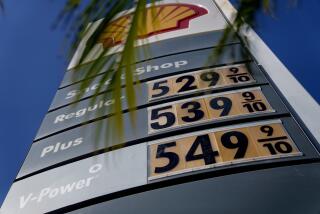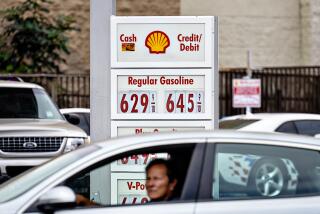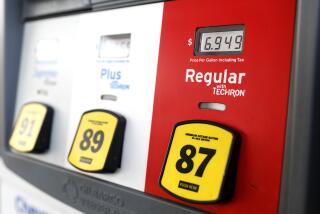What to do about $4 gas
Angelenos don’t get many opportunities to grouse about the weather, so in this town our preferred topic of complainversation is gasoline prices. Lately, we’ve had a wealth of material.
Prices at the pump have been rising for the last five weeks, hitting an average in California of $4.035 for a gallon of regular on Monday, a 5.2% jump over the previous week. This is more than just an inconvenience: If the spike continues, it could derail the nation’s economic recovery. It is also giving rise, as such things always do, to conspiracy theories by people of all political persuasions — most of which aren’t worth the carbon dioxide emitted in their utterance.
On the right, it’s popular to blame President Obama. His “green” energy policies, according to this theory, are the reason it’s costing $80 a pop to fill the tanks of our Ford Explorers; if he would only drill, baby, drill in more places, we could restore America’s God-given right to cheap gas. The fact that this makes no sense hardly slows the chatter on talk radio or the rhetoric from GOP presidential candidates such as Rick Santorum, who repeated this canard Monday. The complaints are enough to make one wonder whom Republicans blamed when similar price spikes happened during the presidency of former oil executiveGeorge W. Bush. In any case, it takes decades from the time a new oil permit is approved before a field is producing reliable amounts of oil, meaning that even if the wildest dreams of oil executives to drill in the Arctic National Wildlife Refuge and other protected places were granted today, it wouldn’t have a noticeable impact on gas prices until around 2030.
The left has its own political talking points. Some on the fringes even believe rising prices are part of a right-wing conspiracy to slow the economic recovery and thus hurt Obama’s reelection chances. Congressional Democrats don’t go quite that far, but they regularly call for probes into price-fixing by the oil giants, although no evidence of this practice has emerged. There are myriad variables involved in the setting of market prices for gas: the price of crude oil, which shifts according to such factors as supply and demand, market disruption or feared disruptions, and speculation by commodity traders; shutdowns of U.S. refineries for routine maintenance; switches in gasoline formulas from winter to more expensive summer blends; and so on. It strains credulity to believe that all of the players involved in this process are conspiring without a hint of the secret leaking out.
Whatever the cause of high prices, the good news is that Americans have more opportunities to wean themselves from the gas pump with every passing year. And although we sympathize with those who can’t reduce or end their addiction — truck drivers and construction workers whose jobs require gas-guzzling four-wheel-drive pickups come to mind — they make up a minority of those who complain about rising costs, most of whom could begin to solve their own problem with a little creativity.
A world of alternatives to the internal combustion engine is flowering, and complaining about the cost is pointless because there’s something to fit every pocketbook: The very rich can buy high-performance electric sports cars made by new companies such as Tesla and Fisker, and those who can’t or don’t want to spend so much can ride public transportation, with Measure R-funded rail lines on the way in Los Angeles County. In between are a host of options: bicycling to work (or, for those who don’t like to pedal, riding a new generation of electric bikes), riding high-mileage scooters and mopeds, or buying a hybrid or electric car. Some next-generation hybrids will hit showrooms this summer, when a newly improved Ford Fusion hybrid arrives and Toyota launches its Prius C, a smaller and more economical version of its popular gas-sipper.
Moreover, not all the options even involve transportation. People can save dramatically on gasoline by moving closer to their workplaces. Moving, like all the choices above, has costs and drawbacks: Housing in job centers is often more expensive than in the suburbs, L.A. transit is still spotty and slow, and scootering is only for the courageous. But those who refuse to change their behavior in response to higher prices deserve to pay them.
The weekly spikes and declines of gas prices cause a lot of economic turmoil and consumer angst, but they matter less than the overall trend, and that can head in only one direction: upward. Rising demand in China and India ensures that gasoline is going to become more expensive over time, regardless of who’s in the White House. Americans can adapt or go broke. So now is as good a time as any to consider trading in that SUV for something more suited to the 21st century.
More to Read
A cure for the common opinion
Get thought-provoking perspectives with our weekly newsletter.
You may occasionally receive promotional content from the Los Angeles Times.






